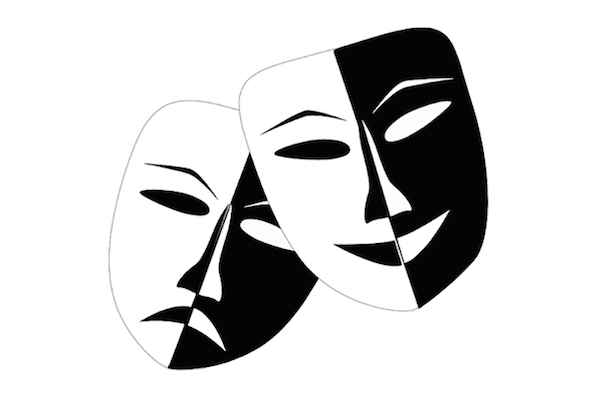
Aristophanes' 'The Birds' struggles to fly at UMSL
By Steve Callahan
Twenty-four centuries ago Aristophanes won second place in the Dionysian festival with his comedy, The Birds. The University of Missouri, St. Louis, has revived this old classic in a brand new adaptation by Jamie McKittrick, who also directs this production.
The Greek classics are difficult to render meaningful to modern audiences. The comedies in particular are so full of topical references, political jabs, and pokes at regional (or personal) rivals that today much of the dialogue leaves us in a daze.
In The Birds two middle-aged friends, Pisthetaerus and Euelpides, are so frustrated with the trials of life in Athens that they decide to go and live with the birds. In fact, they persuade the birds to build a great city in the air -- Cloud-Cuckoo-Land. There, between the earth and the heavens, the birds will be able to blockade Olympus and prevent earthly prayers from reaching the gods. Thus the gods will be starved into submission, and the birds will reign supreme.
Jamie McKittrick has done yeoman's work to modernize the piece. She has given the characters more accessible names: "Pisthetaerus" becomes "Ty"; "Euelpides" becomes "Yulie"; "Tereus" becomes "Terry." (Tereus had been transformed from a king into a bird because of his sins.)
She makes the production awash in music -- we are treated to almost every pop song in fifty years having a lyric pertaining to birds or chickens or flight. There is some rap. There is much percussion, there is much choral dance. There are appearances by the gods: Iris (the rainbow), Poseidon, and an odd unnamed god of the Triballians. There's a demigod (Heracles) and a titan (Prometheus). A veritable all-star show!
There are fantastic, comic bird puppet/costumes by Felia Davenport. We see a quite goofy peacock, flamingo, chicken and a flock of seagulls -- as well as a jackdaw, crow and a hoopoe. In the original play Tereus, as king of the birds, is nearly naked of feathers due to "severe molting"; Here Terry appears in a bird mask and a bodysuit with common white underpants.
The set, by Cameron Tesson is spacious and beautiful. The Des Lee Theatre is set up as an "alley stage," where the audience sits on two sides with the acting space in between. Tesson's set is simple, with varied levels of platform -- all in a lovely speckled blue-green with light blue border lines. Stylized trees decorate one end. Stairs lead to a set balcony at one end, and at the other both levels of the architectural balconies are used for scenes involving the gods. It's altogether lovely. Bess Moynihan ably provides excellent lighting to all of these various acting areas.
Cassidy Flynn leads the cast with illimitable energy as Ty. He briskly scampers about the stage. Moreover he sings with considerable ability. One other outstanding singer is Joshua Mayfield as the Peacock. Dre Williams gives us a very strong Terry, though he's burdened with a great beak that masks his nose and mouth -- not a good thing to impose on an actor/singer. Yulie is given a "beak-on-a-stick," like a lorgnette or a masquerade mask. This is a much less encumbering treatment. Dylan Houston is an attractive Yulie, but occasionally rushes his lines; this, with some less-than-perfect diction makes it hard for us to follow just what's happening. Mona Sabau makes a graceful poet in smock, beret and French accent. She also appears as Iris at an upper balcony and lets fall a great beautiful flow of rainbow-colored fabric. In the chorus Kyle Mertens, playing a chicken, is lithe and agile as a cat.
So there is much to charm our eyes in this production, but it lacks two things to make it appealing to a modern audience, accustomed as we are to modern musical comedy:
- A coherent story line. This production is fairly true to the structure of Aristophanes' play--the characters, the basic incidents, the intrusion of unwanted visitors, the interludes of choral dance and song. But the adaptation fails to make this a modern piece of theater. There's a sense of scatter-shot events. The bird city is built and in the end the gods submit to Ty's demands, but in between there's just a lot of arbitrary action. Just what is Prometheus doing in this story? And the Poet? And the Inspector? And Iris? And that Triballian god?
- Considerably more attention should have been paid to the song and dance. The dances were rather elaborately staged, but there seemed to be no trained dancers in the cast. Similarly much of the "song" was merely lines chanted in time with the music.
The entire cast is energetically committed to the performance. I am grateful to UMSL and to adapter/director Jamie McKittrick for undertaking this project. I had never seen The Birds staged and I was eager to do so. But perhaps it just isn't viable today.
It played at the University of Missouri, St. Louis, October 12 -15.


